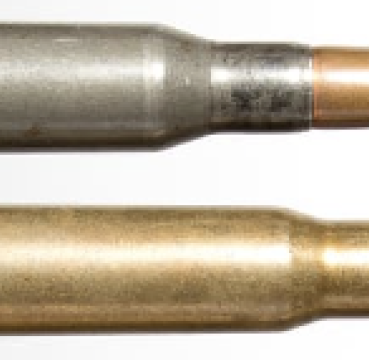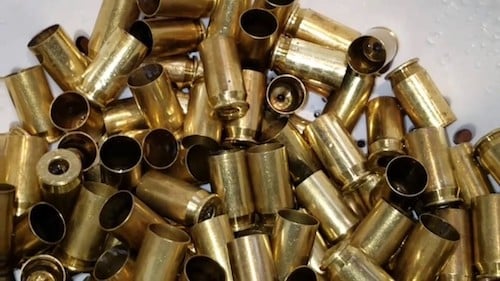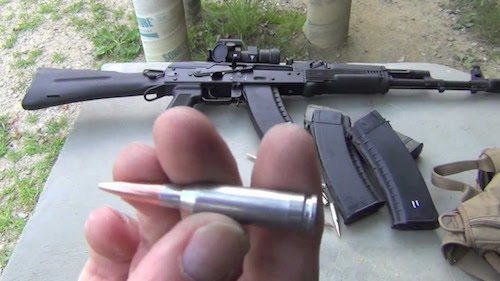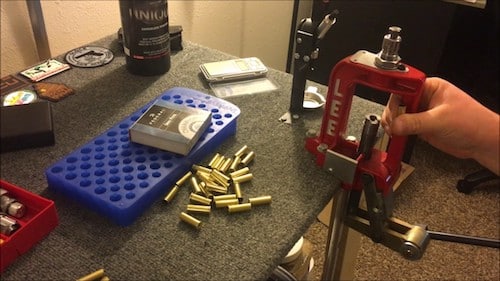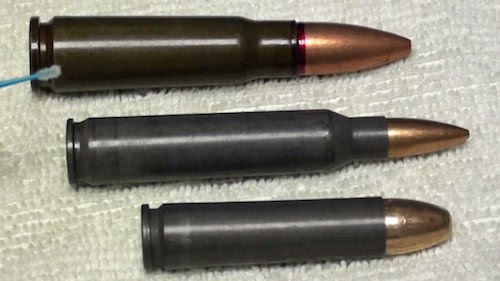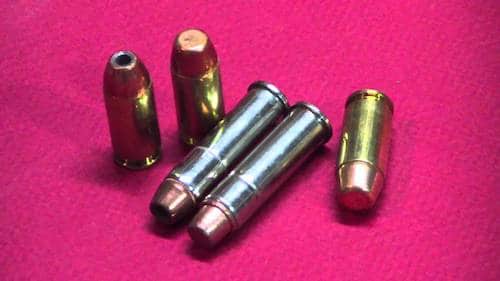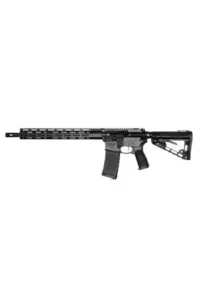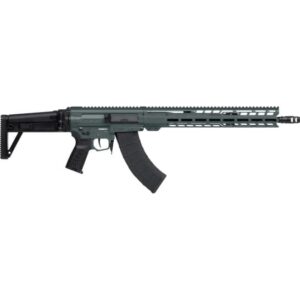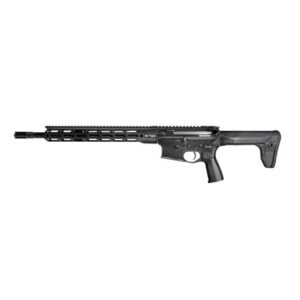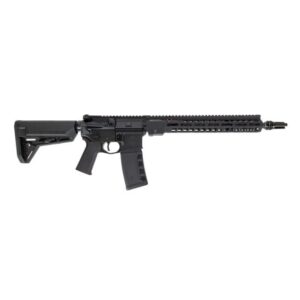Table Of Contents
- Brass VS Steel Ammo – Points of Contention
- Then Again, Steel Ammo Might Not Extract Better
- Is Steel Ammo Worse than Brass Ammo?
- Best Steel Case Ammo
- Which is Cheaper Brass vs Steel Ammo?
- Can Steel Ammo be Reloaded?
- Steel Ammo Needs Case Coatings
- Choosing Between Steel Case Ammo vs Brass
- Choices, Choices… and More Choices
- Brass vs Steel Ammo – Final Thoughts
- Recommended Reading
There is no shortage of debates in the realm of gun owners! Arguments span from the best brand, i.e. members of the church of Glock against everyone, to the all-important discussion on caliber, 9mm versus .40, versus .45. Today we look at the debate – brass vs steel ammo.
As is so often the case, everyone has their own thoughts on the subject…..and then there exists something known as cold, hard facts. Unfortunately, all too often the latter hardly influences the former.
Today I hope to change that, at least in regards to something that has been coming up more and more in online discussions, and especially out at the range. The debate I am referring to, of course, is the debate of brass cased ammo compared vs steel ammo.
Some shooters will tell you to never even think about loading a steel round, while others will sing the praises of inexpensive ammo no matter the results. Both sides have merit in their views I suppose.
Is there really a difference? Should it concern you? Does it matter anyway? Should you change your ammo type? Which ammo is better?
We are going to try to find some clarity on the subject, although it is more likely that we will only add fuel to the fires of both camps.
Brass VS Steel Ammo – Points of Contention
First of all, we need to look at one of the biggest points of contention!
Is Brass Ammo Better than Steel?
BRASS HAS A BETTER SEAL, AND IT JUST RUNS CLEANER
Brass ammo has been considered better than steel ammo for a long time due in large part to the fact that brass makes a better seal when fired. This results in less blowback entering the receiver and chamber.
The reason for this increased sealing is down to the metallurgy of the case, as brass is far more malleable than steel. This malleability allows it to expand to the chamber walls and restrict excess unburned powder from filling the weapon when fired.
Which is Cheaper Brass vs Steel Ammo?
However, steel is by far cheaper but sacrifices a lot when it comes to cleanliness due to its ridged atomic structure.
This has the potential to cause more problems as it can lead to higher amounts of carbon buildup, this can reduce a rifles reliability over time. But as with most things, there are some exceptions to that we will cover in just a bit.
STEEL AMMO vs BRASS (MIGHT) EXTRACT BETTER
Let’s dive into another issue that can make or break either side of this argument; extraction. Most of the weapons produced in the new world use a straight-walled cartridge and light pressure extractors, such as the AR-15 and AR-10.
But then there are things like the Belgian made FAL and AK’s that have been refit to use straight-walled rounds.
If these rifles aren’t tuned to the “sweet spot”, they can easily tear the soft brass off right at the head. This happens because in most cases the firearms were made with looser tolerances and therefore, extract much harder than brass cases were designed to withstand.
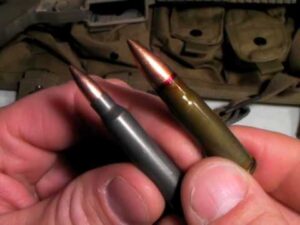
This is because there is some extra metal for the extractor to grab onto due to the larger size of the cartridge. The more surface area that makes contact, the more the force of extraction is distributed, which all, in turn, leads to lower chances of ripping the brass.
What Rifles are Better for Steel vs Brass Ammo?
Generally speaking, a rifle with a longer cycle will have fewer issues than a rifle with a short and heavy extraction. For example, a firearm using a delayed blowback design, like the FAMAS, has a better chance to destroy brass than something like an AR-15.
That said, it is not impossible to run brass through a FAMAS, AK, or FAL without issues.
In fact, it is quite possible indeed!
NOT ALWAYS THE CASE
Many of these rifles may go through thousands on brass-cased rounds without any issues and might not ever be loaded with steel ammo.
However, when it comes to the intermediate rounds, the added strength of steel cartridges is a huge bonus.
It will definitely leave more carbon to be cleaned later, but firearms like the AK and others that have an aggressive extraction may very well work better with steel rounds, in particular, the older surplus guns that were sold as home build kits.
Does this make a huge impact on the shooter that only occasionally heads to the range or the person that takes a break between every shot? Most likely not.
Modern guns made in the former Soviet bloc may not have these issues, or it could simply be that they are better than the rifles made during the height of the USSR, but in any case it is always advised that if you intend to be using your firearm for heavy duty, either competition or personal defense, that you try it with the ammo you want to use before relying on it completely.
How to Tell if Steel vs Brass Ammo is Better?
Steel ammo may work noticeably better in your firearm if you see that you are throwing out torn brass or have to stop to clear torn cases regularly.
It is possible that the reason so many of the Russian designs use the short cycle is that they were being built to accept the steel ammo that was being pumped out in record amounts.
Of course, it is just as likely that the reason so much steel ammo was being produced was to feed the AK style weapons.
Then Again, Steel Ammo Might Not Extract Better
Although steel is much less likely to fail by breaking or tearing, there are still ways to get one stuck.
Steel is hard, and it doesn’t deform nearly as much as brass leading to fewer tears but also contributing to the fact that it is dirtier. This means there is a small chance that the cartridge will unevenly expand which can result in a sticking case.
Sometimes they get stuck in such a way that the only way to clear the chamber it to use a rod and mallet to tap the blockage out.
This can really mess with an otherwise fun day at the range. It can quickly be catastrophic in a serious situation. So as I mentioned before, always test ammo and make changes as needed.
Is Steel Ammo Worse than Brass Ammo?
Somehow it became a commonly held idea that brass ammo is simply higher quality than steel ammo. I am here today to dispel that rumor once and for all. There is nothing that makes steel ammo inherently worse in quality than brass.
However, it is true that a large percent of steel ammo is not held to the same tolerances as brass ammo. This is simply because it is being made for a cheaper market.
But that’s not all of it, as Hornady showed the world with its high grade, competition ready Steel Match ammo.
Even though most steel ammo is lower in quality to brass in general, that is mostly due to the market not better or worse metals.
So if you are looking to win target matches with a steel-tending firearm, you don’t have to force brass into the chamber, just find a higher grade producer.
These rounds can perform just as well as their brass counterparts. In the end, even the best ammo in the world cannot make you a better shot. Marksmanship comes with practice and more practice!
Best Steel Case Ammo
Since the orginal writing of this article one steel casing producer has risen to the top, with an average rating above 4.5 Stars on LuckyGunner.
Wolf Performance Ammo
What makes Wolf Performance steel case ammo help address some of the issues commonly found with steel case ammo has a thin layer of PolyFormance polymer that works to address steel’s reputation for not extracting as reliably as brass, and it protects the round from corrosion as well.
Which is Cheaper Brass vs Steel Ammo?
Steel is cheaper usually. If a marginal drop in quality doesn’t bother you, then you will enjoy steel ammo’s biggest benefit. Steel Ammo is usually cheaper than Brass Ammo.
Most of the steel ammo that you will find in stores and at ranges share something amazing, a low price.
This is in no small part due to the fact that steel ammo isn’t produced with the same attention to tolerance as brass cases. This is the heart of the debate for most of us.
There are those that believe that the lower quality means that steel ammo is not suited for serious shooters. Then there are those that feel that the savings are more than enough to cover the possibility of the odd malfunction.
To be honest, I would say it’s best to not use any cheap ammo for serious use of a firearm, brass or steel, as all cheap ammo is just that, cheap.
However, if you are just popping off a few target shots, by all means, use what is within your budget. If this sounds like most of the shooting you do, steel might be a good option for you, as long as your weapon likes it.
Can Steel Ammo be Reloaded?
Well, it can be, but it gets dangerous.
This goes back to brass’ malleability, as it can safely be reshaped and sealed easily when reloaded. This is a process called, simply enough, resizing.
If you don’t want to fuss with reloading your spent cases then this won’t matter much to you. But for shooters that go through thousands of rounds, a year reloading presents a great way to save money.
Steel, by comparison, is difficult to resize, preferring to stay expanded and deformed. This leads to two or three safe uses before it has degraded too far and must be disused. Luckily steel is a very recoverable metal so old steel cases can be recycled just as easy as aluminum cans.
Steel Ammo Needs Case Coatings
Due to the makeup of steel, it is not as slick as brass, which can make sticking cases worse.
To compensate for this, most steel ammo comes from the factory covered with a special coating. This coating is to help prevent corrosion and help with extraction.
However brass is naturally slick, which makes extraction easier, and it also has corrosion-resistant properties so any coating added to brass ammo is optional.
There are generally two coating put on steel ammo, the newer and usually pricier polymer, or cheap lacquer.
The cheaper brands, such as Brown Bear, use lacquer that is thought to be less reliable than the polymers because of an idea that it might melt and lead to a nasty build up in the chamber.
However, that isn’t the case, at least not as far as our friends over at Lucky Gunner could find.
In fact, their data showed that the lacquer coated Brown Bear ammo only malfunctioned around half the time the polymer-coated Wolf ammo did in an AR-15.
I suggest that if you are a fan of hard science (and the idea of shooting copious amounts of ammo) that you check out their entire study.
That’s right, after firing 30,000 rounds, even the worst of the three brands tested had only 15 foul-ups! (Tula was partially discounted due to issues with the test rifle)
Now fifteen might seem like a lot of stops, but it represents only 0.15% of the total, leaving a success rate of 99.85%, not too bad in my opinion.
But is that really good enough?
NOTE – Since the original writing of this article, Brown Bear lacquer covered steel casing ammo has been discontinued.
Choosing Between Steel Case Ammo vs Brass
Now that you have the information and you’ve thought it over, which one should you use?
The answer is simple and complex at the same time because it depends on everyone’s preferences.
- Is it better to carry a 9mm or .40 S&W concealed?
- Do you want more shots per mag or more impact potential?
- Is striker-fire superior to hammer-fire?
- What kind of safety is the best? Is it ok to carry with a round in the chamber?
As you can see, it all comes down to what you want to get out of your shooting experience.
Is your AK from the mid-’50s with Chinese character carved into it? That may work best with steel ammo.
Did you just purchase a brand new AR-15 with all the bells and whistles? Perhaps brass ammo is better suited here.
Do you plan on reloading your rounds after some range time? Again brass will most likely work out better for you.
Do you only shoot a few times a year and want to save money? Steel might just be for you.
Choices, Choices… and More Choices
In the end, it comes down to the choices of the individual. You will have to think about it and draw your own conclusion.
The best way to find out what ammo a rifle likes the most is good old range testing. If you are planning on using a firearm for self-defense, testing is important. I suggest no less than 500 rounds of test ammo before making a decision.
If the rifle is just for fun on the firing line, then you don’t need to test as much. Either way, it will still benefit you to try a few types of ammo to find the best for you.
I for one prefer to use brass. As I do reload my spent cases to save money. I spend more time shooting for pennies on the dollar.
Brass vs Steel Ammo – Final Thoughts
To sum up, here are the highlights of the Brass vs Steel Ammo debate.
Brass expands easier than steel, sealing better with the chamber, which leaves the rifle cleaner after use.
- Steel can take more abuse when extracted, leading to fewer issues in certain guns.
- Steel isn’t intended to be reloaded, but brass can be reused many times.
- Brass is slicker than steel and doesn’t require a coating.
- Steel has a tendency to stick in long cycle designs due to lighter extraction.
- Brass ammo isn’t inherently better or worse than steel, and vice versa.
- Always test all ammo/firearm combos if defense is the primary mission.
I hope this will give you the information you need to make an informed decision. There are good things and bad things to be said about each of these options. The key is to be open-minded next time you are making an ammo purchase. Do that, and you might just discover your rifles new favorite ammo.
No matter what you choose, it is important that you do what is best for you and your equipment. I’ve shared all of the important facts (at least of what I know). Now, it is your turn to ponder, test, and ultimately decide on your best ammo.
So, Brass or steel, what do you run? I’d love to hear what everybody is using. Leave a comment and let me know what the deciding factor was for you personally. Shoot safe!
